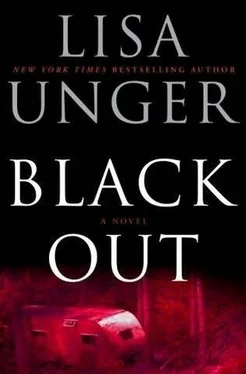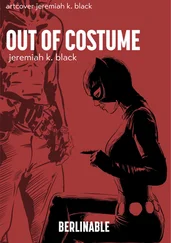“No,” I say.
Dax is looking at me hard. He might have been a handsome guy once, but his eyes tell me something about the things he’s done and seen. His skin is creased and weather-worn; his mouth is a thin, tight line, a mouth that looks as though it has never smiled. He puts his hand on my arm again. I wonder if he’s going to try to muscle me onto the Whaler.
“I want my gun back,” I say, bracing myself.
He squints at me. Then after a second’s hesitation, he takes the gun from his waist and hands it over. “Let’s go,” he says, pulling me back toward the ladder.
“You go,” I say. “I can’t. I need this to end tonight. One way or another. I can’t just keep going and going. I get in this Whaler and then what? We hang out on some island until the sun comes up? Or we drive until the boat runs out of gas? We’re sitting ducks then, too.”
“We’ve been out of contact for over an hour. Another team will come for us before either of those things happens,” he says. He’s yelling now out of frustration, not just so I can hear him. His eyes are scanning the horizon as if he’s already looking for the lights of another ship.
“When they do, bring them back,” I say. I sound calm and sure, not at all how I feel.
“Don’t be an idiot,” he says, tightening his grip. He looks at me with some combination of concern and disdain. “You’re so far out of your league you don’t even know what you’re playing at.”
“You work for me, right?” I ask. He nods. “Then you’re fired.”
He shakes his head in disbelief but releases my arm and doesn’t move to stop me as I run back toward the stairway that leads to the helm. Before I step inside, I hear the engine of the Whaler and turn to see the white of the boat get swallowed by the night. My heart sinks as it disappears. I wonder how big a mistake I’ve just made and what it’s going to cost me.
When Victory was first born, I was terrified of her. She was this tiny, swaddled bundle, her small head nearly disappearing in her newborn cap. She wasn’t one of those screaming babies who want the whole world to know they’re here to stay. She was still and quiet, almost observant. When I looked into the deep brown of her eyes, I wasn’t sure what I saw there; she seemed tired and a bit shocked, maybe even disappointed. It didn’t seem as though she’d made her decision whether to stick around or not. Her breathing seemed too shallow, her limbs impossibly delicate. I felt as if she could disappear at any moment. Several times a night, I would startle from sleep and slip over to her bassinet, not to see if she was still breathing but to see if she was still there.
Victory always appeared relieved in Gray’s care, though she seemed even tinier against the wide expanse of his chest. I imagined her issuing a faint sigh and turning up the corners of her mouth just slightly. Sometimes when I was nursing her and she had her wide, watchful eyes on my face, I could swear she was thinking, Are you sure you know what you’re doing here? Are you really qualified for this? With Gray she seemed utterly peaceful, as if she knew that in his thick, capable arms she was totally safe. With me she wasn’t so sure.
I used to dream that she’d be taken from me. In those first heady weeks, the sleep I got was riven with nightmares. I dreamed that the nurses came to the delivery room and shuttled her off, with me screaming after her. I dreamed I brought her to the pediatrician for her first visit and they refused to let me leave with her, citing my obvious lack of competence. I would wake up breathless, shame and rage racing through me like a white-water current.
When I first started going out of the house with her, I was afraid that I would accidentally leave her somewhere, that I would absentmindedly walk off and forget her in the grocery store or at the bank. I imagined in vivid detail tripping and losing my grip on the stroller and watching helplessly as it careened into oncoming traffic, or botching the fastening on the front carrier and being unable to catch her as she fell from it. In other words, I was a basket case most of the time.
“Every new mother has these kinds of feelings,” my shrink would tell me. “It’s a normal response to the massive and unfamiliar responsibilities in your life. Victory relies on you totally for her survival. That’s an awesome realization. Then, of course, there’s your lack of a good role model. Though obviously your mother didn’t do everything wrong. You survived, after all.”
“Just barely,” I said. I always felt this childish wash of anger with anything less than his total indictment of my mother. Especially in conversations that centered on Victory.
“Well,” he said, with a deferential nod, “yes. But consider this: Just because your mother didn’t love you enough doesn’t mean you start with a deficit of love for Victory.”
I didn’t follow, and my expression must have communicated that.
“I’m saying that you don’t need to make up for what your mother didn’t give her little girl-you-by overcompensating with Victory. That doesn’t make you a better mother. A child needs a whole and healthy mother, someone separated from her to a certain degree. Otherwise, when she naturally starts to move away, she will feel as though she’s taking something from you. She’ll feel that you need her too much. It will cause her pain, guilt, impede her emotional development. Does that make sense to you?”
I made the appropriate affirming noises, but I didn’t see how a mother could love her child too much. Seemed like only a man could imply such a thing.
That afternoon, after the detective’s visit, while Victory is still in school and Gray has gone off to do whatever it is he does in a crisis situation, I move my stash to a locker at the bus station in the downtown area.
It’s a small and seedy place about a block away from the police department. A homeless man drinks from something wrapped in brown paper and watches me from the bench where he reclines. I feel his eyes on the back of my neck as I shove my bag into the locker and take the small, orange-capped key. Feeling conspicuous and a bit silly, I wonder what well-intentioned or aboveboard reason someone might have for stowing belongings in a bus-station locker. As I walk back to my car, the homeless guy’s still looking at me. He’s wiry, dirty in a red-and-white checked shirt and jeans, beat-up old sneakers.
I don’t judge him. Once, I woke up to find myself lying on a public bench, unwashed, disoriented; I wonder if this man, like me, is mentally ill. But he doesn’t seem afraid or unstable. If anything, he seems comfortable, resigned. I wonder what he’s thinking about me and my obviously guilty errand as I drive off. But I don’t suppose he’s in any position to judge me, either.
I stop at the gas station on the way back to the house. The only thing more depressing or suspect than a public locker is a gas-station pay phone. Maybe because they remind me of all the miserable calls I made to my father from just such a phone. They make me think of teenage runaways huddled against the rain, succumbing finally to desperation and fear, calling their parents and begging to come home. Or adulterers sneaking off to call their lovers. Only under such bad conditions would one find it necessary or desirable to huddle in the little metal shell, press her mouth and ear against the filthy receiver.
Paying with cash, I buy a calling card from the clerk and then walk over to the phone. I call the number I have memorized.
“Leave a message,” answers a low male voice. “No names. No numbers. If I don’t know who you are, you shouldn’t be calling me.”
His voice brings back memories of a sunny common room, the smell of institutionally prepared food in the air, the jangling and cheering of a television game show, the volume down low. We played Go Fish in our pajamas every day for a month, drawn to each other I suppose because we were the only patients connected to reality at all. Everyone around us drooled and stared, issued the occasional scream, or called out a name.
Читать дальше












